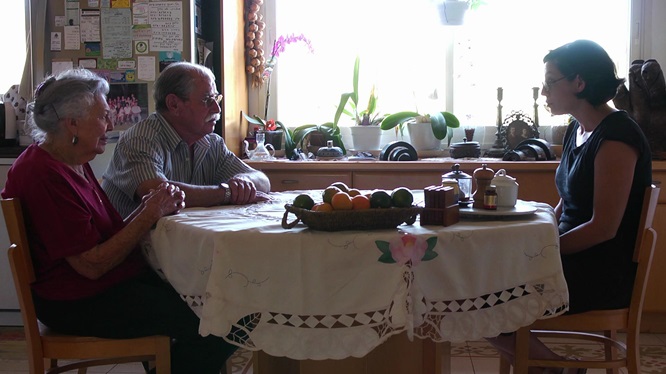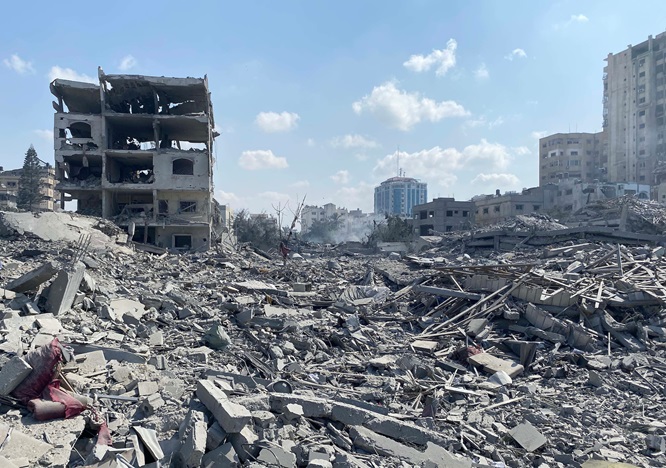
:: Mirror Image (2013) [Danielle Schwartz]
Why can’t I see what’s right in front of me? The painting I bought from the genius artist who came to prefer heroin to art—this was his last effort. The midcentury modern chair my parents bought in a fit of stylish optimism in the mid 60s, recovered often, most recently in a shiny fabric that recalls the Emerald City of Oz. I make these objects invisible not through repression but overexposure. It is one of the most effective ways of creating invisibility in this digital moment, when everyone I know is busy stuffing ourselves with other people’s pictures, words and opinions.
Salma, October 14 (2023)
Today is my birthday. I was planning to have a big birthday, but the war prevented that. [1]
Every day, the news delivers images of children bloodied and buried in the rubble or forced to pick pieces of what is left of their fathers and mothers from the ruins of what used to be their living room. There are a couple of words I am hesitant to use to describe these children. The first is “Palestinian”. As soon as I attach this word to a child, they vanish for many people who live in my country. A few decades ago, this word was “Communist”. Countries could be invaded, foreign governments overthrown, entire continents terrorized because of this word. These keywords draw a line between who is human and who isn’t. Perhaps the history of my country could be rewritten to make clear how it has created, again and again, keywords, laws and practices that render large parts of its own population invisible.
Why can’t I see what’s right in front of me? In the hopes of finding some answers, I turned to Danielle Schwartz’s brilliant home-movie short Mirror Image (2013). She is an Israeli Jew, writing the story of her grandparents and reading her account aloud, inviting them to comment. The first word that needs to be replaced (erased) is “Palestinian.” As the filmmaker’s grandmother Rivka points out, “In those days, we wouldn’t say ‘Palestinian village,’ we’d say ‘Arab village.’” When Danielle notes that the neighbouring Palestinian village was conquered by an armed Jewish militia in 1948 (the village emptied, and the Palestinians were forced into permanent exile), her grandfather Yossi wonders aloud why this is relevant. Enter the mirror. The family owns a handsome, full-length mirror that Yossi’s father gave him, and it came from Zarnuqa—the erased Palestinian village. The mirror belonged to a Palestinian family, but was left behind when they were forced to leave home.
Yossi and Rivka make clear that they are not thieves; they would never take something that belonged to someone else. As Rivka says, “That’s what happened to the mirror, not to us.” They go to great lengths to separate the Nakba (the catastrophe of the Palestinians in 1948 when villages were emptied across the new country) from this mirror. Rivka: “There are people who are not like us. And that’s what happens in wartime.” What story can I tell about myself that will keep all blame from touching me? How can I re-order historical events so that I am spotless and clean, a good and virtuous person?
Racism is one of the most powerful agents of invisibility. How can we have an identity if we can’t draw a line around what is us and what is not us? There are people who are not like us. As the secret graveyards of Canada’s Residential Schools have made clear, there is a high cost to pay for being invisible.
Sara Besaiso, October 14 (2023)
These past six days we’ve had no rest, we’ve barely slept through the night. Our family had to evacuate from three different houses. The neighborhood where I live was bombed with white phosphorus, which violates international humanitarian law. But nothing is too illegal to be used on us Gazans. We are not Europeans after all.
Two days ago they asked 1.1 million people to go south. To where they did not say. They told us to go south because it was safer there. Then they bombed the south. They have cut off electricity, water, and all the resources a human being needs to live.
I am 16 years old and I have lived through seven wars. That’s almost more than a quarter of my life. This is all I’ve seen from living here. What we’re asking for is peace. We want this attack to stop. What is our fault as civilians? Is it our fault to have been born in this city? Half of the civilians around me are children, who don’t understand why this is happening to them. “Why?” they’re asking. Can you tell us why this is happening? [2]

:: Gaza's Rimal neighbourhood, October 9, 2023 [Wikimedia commons/Wafa]
[1] Salma, “Can you tell us why this is happening? Testimonies from Gaza”, n+1 (Nov. 13th, 2023),
https://www.nplusonemag.com/online-only/online-only/can-you-tell-us-why-this-is-happening/
[2] Sara Besaiso, ibid.
*
Mike Hoolboom began making movies in 1980. Making as practice, a daily application. Ongoing remixology. Since 2000 there has been a steady drip of found footage bio docs. The animating question of community: how can I help you? Interviews with media artists for 3 decades. Monographs and books, written, edited, co-edited. Local ecologies. Volunteerism. Opening the door.
 |
envoyer par courriel | 
| imprimer | Tweet |
